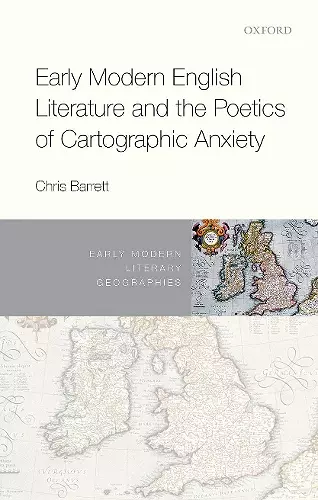Early Modern English Literature and the Poetics of Cartographic Anxiety
Format:Hardback
Publisher:Oxford University Press
Published:22nd Mar '18
Currently unavailable, and unfortunately no date known when it will be back

The Cartographic Revolution in the Renaissance made maps newly precise, newly affordable, and newly ubiquitous. In sixteenth-century Britain, cartographic materials went from rarity to household décor within a single lifetime, and they delighted, inspired, and fascinated people across the socioeconomic spectrum. At the same time, they also unsettled, upset, disturbed, and sometimes angered their early modern readers. Early Modern English Literature and the Poetics of Cartographic Anxiety is the first monograph dedicated to recovering the shadow history of the many anxieties provoked by early modern maps and mapping in the sixteenth and seventeenth centuries. A product of a military arms race, often deployed for security and surveillance purposes, and fundamentally distortive of their subjects, maps provoked suspicion, unease, and even hostility in early modern Britain (in ways not dissimilar from the anxieties provoked by global positioning-enabled digital mapping in the twenty-first century). At the same time, writers saw in the resistance to cartographic logics and strategies the opportunity to rethink the way literature represents space—and everything else. This volume explores three major poems of the period—Edmund Spenser's The Faerie Queene (1590, 1596), Michael Drayton's Poly-Olbion (1612, 1622), and John Milton's Paradise Lost (1667, 1674)—in terms of their vexed and vexing relationships with cartographic materials, and shows how the productive protest staged by these texts redefined concepts of allegory, description, personification, bibliographic materiality, narrative, temporality, analogy, and other elemental components of literary representations.
The last thirty years have witnessed an explosion of interest in Renaissance maps, cartography, and representations of space, fueled in part by a revolution in mapping technology that has suddenly allowed our phones to guide us to our destinations or to zoom in on an image of our house taken from an orbiting satellite. Chris Barrett's erudite and insightful book engages this material while considering the peculiar and sometimes fraught ways that English Protestant poets reacted to their own era's cartographic turn. * Blaine Greteman, Milton Quarterly *
Although preeminently a work of literary criticism, Barrett's book remains grounded in the history of cartography and more-general ideas about space. Barrett fills her book with fascinating and apposite details ... this book kept me thinking and scrawling notes for reasons beyond this review. Barrett convinces me of the importance of how these three authors engage with the concepts of space implicit in the cartographic revolution they witnessed. Barrett also convinces me to look more closely at the next map I see, and to think about what it says and does not say about the world and our experience of it. * Sean Henry, Clio *
...this is a work of considerable intellectual commitment and authority, deeply immersed in the complex literary texts on which Barrett focuses and founded upon exceptional skills of textual analysis. * Andrew McRae, Spenser Review *
ISBN: 9780198816874
Dimensions: 224mm x 147mm x 21mm
Weight: 440g
244 pages